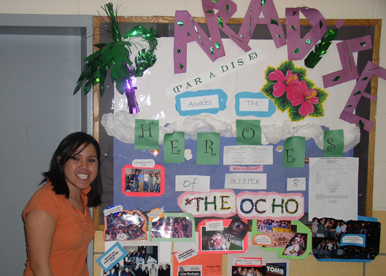R & R for RAs
Resident assistants get kudos during Appreciation Week

On a given day, Boston University’s resident assistants may have to mediate roommate squabbles, schedule maintenance for that clogged toilet, break up a noisy party full of fellow students, or climb out of bed at 4 a.m. to help an undergraduate locked out of her dorm room. Working as an RA can be an enriching college experience, allowing students to become a more active member of the campus community. But the job does have its challenges.
The University’s Office of Residence Life will honor RAs for their hard work next week during RA Appreciation Week, April 9 to 13. For the third year in a row, they will get a much-deserved break from their hectic routines, with an ice cream sundae party thrown by Dining Services on April 11. Prizes donated by local vendors will be raffled off at the party.
“This is our way to show our appreciation for all the hard work they do, because it’s a tough job,” says Laura De Veau (CGS’87, COM’89, SED’95), assistant director for student and staff development at the Office of Residence Life. “We say it’s a 20-hour-a-week job, but it’s really a 24/7 job, because they are always on call and always accountable.”
De Veau says RAs need to be visible on their floors and in their buildings. Their duties include attending weekly staff meetings, maintaining daily logs of their interactions with students, working frequent all-night on-call shifts, and hosting activities for their residents at least once a month. The responsibilities of an RA, who also must juggle schoolwork, other part-time jobs, and social commitments, can be downright intimidating.
“RAs are the first point of contact for students, dealing with everything from lock-outs and maintenance problems to major crises, like some of the recent tragedies that have happened on campus,” says Stephanie Ehresman (CAS’07, COM’07), a philosophy and public relations major, who has been an RA in South Campus for two years. “However, the Office of Residence Life does a truly wonderful job of making the RA staff feel like a community, and I quickly found that I could rely on my fellow RAs, senior RAs, and area directors to help me and guide me through the challenges of the position.”
The job has other rewards, RAs say. Besides earning free housing for their service, they gain valuable life experience and lasting friendships.
Erica Mosca (CGS’06, COM’08) regards her time as an RA in West Campus as one of the most satisfying, challenging, and educational experiences of her life. “I find it rewarding that my residents feel comfortable enough to come into my room and vent about things, from relationship problems to the realization that they’re in the wrong majors, because they know that I care and that I will listen to them,” Mosca says.
A print journalism major planning to go straight on to law school, Mosca instead has applied to Teach for America because of her positive experience as an RA. “I find it most rewarding that after my residents gained respect for me — after they realized how much I care about each and every one of them as human beings — they began to perpetuate a self-regulating community, where people are accountable for their actions.”
Many RAs say that one of the most difficult aspects of the job is drawing the line between being a friend to their residents and being their RA. Katherine Marshall (SHA’07), an RA in the Student Village, says that one of her greatest challenges is saying no. “RAs are frequently faced with residents asking for exceptions for this reason or for that reason,” she says. “It can be difficult to put your foot down and tell them, ‘Sorry, I can’t help — those are the rules.’”
One of the rules they won’t bend on is fire safety. Following two recent fatal fires in off-campus apartments, RAs are holding mandatory floor meetings with their students to discuss the fires and the safety regulations that are in place.
“It has been a difficult year for the community,” says De Veau. “I definitely think that RAs have had a lot of conversations with their residents about how they are feeling and what they are doing to make sure they are safe.”
Nalini Gupta (CAS’07), an RA in Warren Towers, advised her residents to be aware of their surroundings and identify more than one exit wherever they are, within the University or anywhere else. She also instructed them on how to evacuate the building, including the dining hall, in case of a fire.
“I made them realize that Warren Towers has no fire drills, and they need to take each fire alarm seriously and leave the building,” says Gupta. “Then, I asked them how they would feel if they lost everything in their dorm room because the person down the hall made a careless mistake that led to a fire. By personalizing the question and placing the residents in the shoes of someone who lost everything, I hope they were able to realize the importance of the situation.”
Meghan Noé can be reached at mdorney@bu.edu.